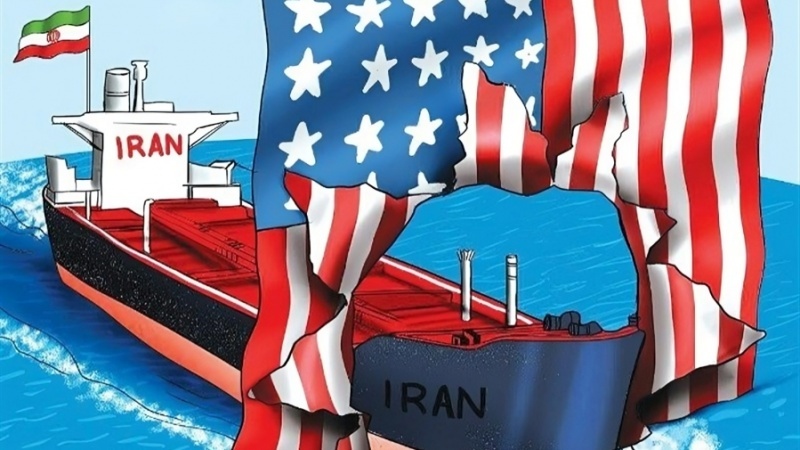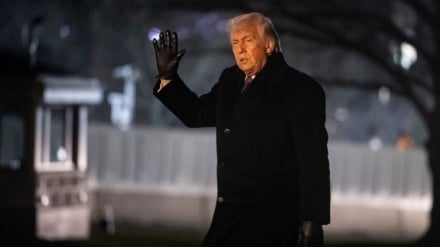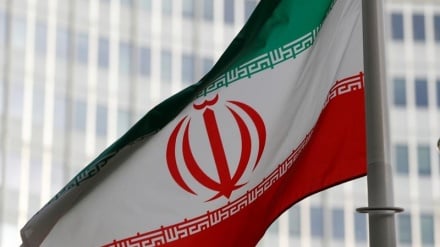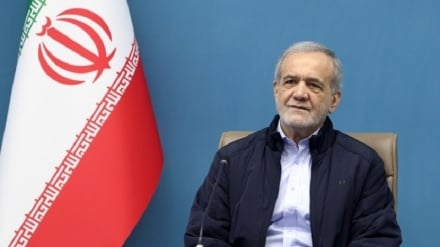What is the U.S. seeking with its new sanctions against Iran?
-

The U.S.’s failed attempt to halt Iran’s oil exports
Pars Today – The United States has imposed new sanctions to prevent the sale of Iranian oil.
According to Pars Today, the U.S. Treasury Department on Tuesday, continuing Washington’s maximum pressure campaign against Tehran, targeted seven companies and nine oil tankers, citing their involvement in the sale of Iranian oil and attempts to circumvent U.S. sanctions on Iran.
The U.S. Treasury Department claimed that today’s action is based on the July 3, 2025, sanctions under the Office of Foreign Assets Control (OFAC), targeting the network of Saleem Ahmad Saeed. According to U.S. claims, this network was involved in smuggling blended Iraqi and Iranian oil, generating significant revenue for the Iranian government.
The U.S. body asserted that, overall, these measures demonstrate Washington’s commitment to halting Iran’s harmful influence on Iraq’s economy and supporting the campaign of maximum economic pressure on Iran, in line with National Security Directive-2. This action is carried out under Executive Order (E.O.) 13902, which targets individuals active in specific sectors of Iran’s economy, including its oil and petrochemical industries.
On February 4, 2025, the U.S. President signed a memorandum to continue the policy of maximum pressure against the Islamic Republic of Iran, claiming to be ready for dialogue with the Iranian President. However, despite five rounds of indirect negotiations between Iran and the U.S. and the claim of a diplomatic approach toward Tehran, Israel, on June 13, 2025—just two days before the scheduled sixth round of talks on June 15—carried out military strikes targeting areas in Tehran and other cities, including Iran’s nuclear facilities, resulting in the deaths of several scientists, military personnel, and civilian citizens.
Furthermore, on June 22, the United States attacked Iran’s nuclear facilities in Fordow, Natanz, and Isfahan, prompting the Armed Forces of the Islamic Republic of Iran to respond to these military aggressions. This action by Washington symbolizes the U.S.’s illegal measures in striking a United Nations member state without any authorization from the UN Security Council, as well as actions completely contrary to the regulations of the International Atomic Energy Agency (IAEA) and the Nuclear Non-Proliferation Treaty (NPT).
The Trump administration, within the framework of its maximum pressure campaign against Iran and following its military attacks, is now seeking to exert the highest possible pressure to reduce or halt Iran’s oil exports through sanctions, with each new round announced periodically. The primary goal of the United States in imposing these new sanctions on Iranian oil exports is to increase economic pressure on the Islamic Republic and limit its financial resources. These measures are part of the “maximum pressure” strategy aimed at changing Iran’s behavior in various areas, including its nuclear program, support for anti-imperialist movements in the region, and the development of advanced weapons, particularly missiles.
Key objectives of the new U.S. sanctions on Iran:
- Reducing Iran’s Oil Revenues: The aim is to limit the Iranian government’s financial capacity to fund military and security programs, including the budgets of the Armed Forces, the Ministry of Defense and Armed Forces Logistics, and the Law Enforcement Force (FARAJA).
- Disrupting Iran’s Oil Sales Network: The U.S. has sanctioned companies, ships, and individuals associated with Iran’s “shadow fleet” to block unofficial oil export routes.
- Preventing Sanctions Circumvent: Many of the sanctioned companies are based in third countries such as China, the UAE, Greece, and the Marshall Islands, which Washington claims were helping Iran bypass sanctions.
- Weakening Iran’s Energy Diplomacy: By limiting Iran’s access to global oil markets, the U.S. seeks to curb Iran’s regional and international influence.
- Increasing Pressure for a Return to Nuclear Talks: Some analysts believe these sanctions could push Iran toward accepting a new agreement on its nuclear program, although Iran has currently halted negotiations due to U.S. breaches of previous commitments.
Iran’s response to the new U.S. sanctions on oil exports
Iran’s response has generally combined political statements, diplomatic measures, and efforts to mitigate the economic impact of the sanctions. Regarding the recent oil sanctions, Iran has taken a multifaceted approach, including:
Official Positions:
- Condemnation of the Sanctions: Iranian officials, including the Foreign Ministry, have described the new sanctions as “illegal” and a “violation of international law,” emphasizing that these measures will not affect Iran’s resolve.
- Continuing the Path of Resistance: Iran has stated that it will persist in its policies regarding oil exports and economic development, viewing the sanctions as no serious obstacle.
Practical measures
- Enhancing Cooperation with Asian Partners: In this context, Iran has sought to strengthen its economic relations with countries such as China, India, and Russia in order to mitigate part of the pressure from sanctions.
- Using Alternative Methods for Oil Sales: This includes employing intermediary companies, changing transportation routes, and selling oil through barter or in non-dollar currencies.
- Increasing Engagement with Neighboring Countries and Anti-Sanction Blocs: Iran aims to expand its economic and political cooperation with countries that oppose U.S. sanctions, such as certain BRICS members.
In some cases, Iran has filed complaints with institutions like the International Court of Justice to challenge the legitimacy of the sanctions.


